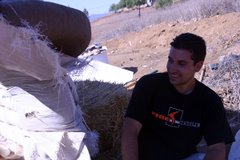From Conflict to Community
It is incredible to have the opportunity to work with American Sudanese Partnerships. It is rare for an organization to be allowed to operate particularly in the Darfur region. I honestly thought that I would have to spend at least twenty or thirty years in a government job to be able to be involved in something like this. This year has really changed my perspective on what students can do in the world. It has been a real inspiration to our SIFE team and other teams we have come in contact with. Check out the American Sudanese Partnerships blog for a great read as things develop further.
American Sudanese Partnerships: Winter in Khartoum and Darfur
The next thing we'll be working on in SIFE with this is to turn the documentation into a business case study so people can help us further develop our economic development plans to accompany the building of the villages. We are looking at using several ideas already very successful in our work with Kalaala, Ethiopia, a village our SIFE team has been working with in cooperation with the International Medical Aid Association. You can read more about that project here Projects or the video below about our SIFE Water project where 100% of the profit directly benefits the village in Kalaala.
Once we turn it into a case study, we will be seeking to involve other colleges and universities and especially you, the reader, in coming up with new ways to have a sustainable impact in the villages in Darfur. My favorite concept so far has been the PlayPump system mentioned in the previous post. When you don't have unlimited resources and modern technology to work with, which is usually the case, it becomes important to conduct thorough analysis, and build upon existing strengths. We have lots of earth to work with, so we build homes primarily out of it, children love to play and people need clean water so the PlayPump was developed, the list goes on and on.
One of the most important things our team has come to realize while developing ideas is the concept of home. It is incredible to be able to help people build new homes that are strong, long-lasting, energy efficient, and even attractive. Having a home is about much more than just a roof over your head. Right now, the "luckiest" displaced families in the refugee camps live under tents made primarily of plastic sheeting given to them by the U.N. or aid groups. The sheets are often mixed with scraps of cloth in an attempt to made a more resistant structure. The camps are filled with these shelters.
What we now have the opportunity to do is go far beyond plastic tents. When considering building villages anywhere in the world, Darfur may be the last place most people would recommend, but the need is greatest there. After the first village is complete, it will serve as a model of what is truly possible in the world. The first village network will have an estimated 1,500 eco-dome homes, a school, a hospital, and an entire infrastructure in conjunction with the National Unity Government and local officials. We plan to start the bulk of economic development focused on agriculture and potential future construction. In essence, we are forming an entire economic system for the area, drawing from knowledge even further than what we are learning in our classes. We work on all of this in the hope that it can be applied all around the world, especially in areas people have often already signed off as a lost cause.




No comments:
Post a Comment